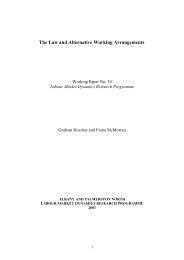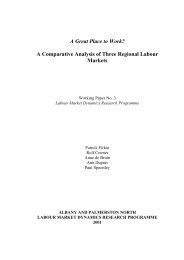transitions in the south waikato labour market: an ethnographic study
transitions in the south waikato labour market: an ethnographic study
transitions in the south waikato labour market: an ethnographic study
Create successful ePaper yourself
Turn your PDF publications into a flip-book with our unique Google optimized e-Paper software.
ecause I’d just be home all <strong>the</strong> time you know <strong>an</strong>d yeah it’s just I c<strong>an</strong>’th<strong>an</strong>dle not be<strong>in</strong>g at work. …I still m<strong>an</strong>age to look after <strong>the</strong>m <strong>an</strong>d work aswell <strong>an</strong>d I look at work<strong>in</strong>g as giv<strong>in</strong>g <strong>the</strong>m someth<strong>in</strong>g a little bit better youknow. The money that I get from my job is for <strong>the</strong>m k<strong>in</strong>d of th<strong>in</strong>gFor those who worked <strong>in</strong> family bus<strong>in</strong>esses, <strong>the</strong> contributions of a spouse or partnercould be import<strong>an</strong>t to <strong>the</strong> viability <strong>an</strong>d profitability of <strong>the</strong> enterprise. These womenoften felt that it was common-sense that <strong>the</strong>y to be <strong>in</strong>volved this way. As <strong>the</strong> wom<strong>an</strong>quoted earlier noted, not only did be<strong>in</strong>g self-employed enable her husb<strong>an</strong>d to be more<strong>in</strong>volved <strong>in</strong> car<strong>in</strong>g for <strong>the</strong> children, for her it was also a valuable <strong>in</strong>-road <strong>in</strong>to paidwork.This re-entry <strong>in</strong>to paid work was often difficult to achieve as women had to comb<strong>in</strong>epaid <strong>an</strong>d unpaid responsibilities. As <strong>the</strong> high level of part-time work <strong>in</strong>dicates, jobswere usually premised on <strong>the</strong> needs of children. Occasionally, though, it was childrenwho had to adapt. Although she was able to arr<strong>an</strong>ge childcare, work<strong>in</strong>g <strong>in</strong> <strong>the</strong> even<strong>in</strong>gshad negative implications for this wom<strong>an</strong> <strong>an</strong>d her family.The kids hardly saw me. …<strong>the</strong>y really w<strong>an</strong>ted me more <strong>the</strong>n, at home, th<strong>an</strong>I was do<strong>in</strong>g. …[but] after a while <strong>the</strong>y got used to it.Like o<strong>the</strong>rs, it seemed that personal <strong>an</strong>d f<strong>in</strong><strong>an</strong>cial motives drove this wom<strong>an</strong>. Whilst<strong>the</strong>se could me<strong>an</strong> that work priorities sometimes outweighed o<strong>the</strong>rs, <strong>in</strong> most cases,women did not describe such severe pressures <strong>an</strong>d were able to search out work thatdid not affect <strong>the</strong>ir children <strong>an</strong>d/or that fitted with <strong>the</strong>ir schedules <strong>an</strong>d needs. As thiswom<strong>an</strong> did, <strong>the</strong>y might also elect not to cont<strong>in</strong>ue work that <strong>the</strong>y though had <strong>an</strong>yadverse implications for <strong>the</strong>ir family.They’ve got long hours <strong>an</strong>d <strong>the</strong>ir hours are ch<strong>an</strong>g<strong>in</strong>g all <strong>the</strong> time whichme<strong>an</strong>s that my kids are gonna be home one day <strong>an</strong>d not home <strong>the</strong> next day.And it would be just too difficult try<strong>in</strong>g to get to work <strong>an</strong>d worry<strong>in</strong>g aboutwhere <strong>the</strong> kids are <strong>an</strong>d that … I just wouldn’t go back <strong>the</strong>re at <strong>the</strong> moment.As she alludes to <strong>in</strong> her last sentence, <strong>the</strong> age of children was <strong>an</strong> import<strong>an</strong>t factor <strong>in</strong>considerations regard<strong>in</strong>g paid work, with women wait<strong>in</strong>g till <strong>the</strong>ir children were atschool or k<strong>in</strong>dergarten before contemplat<strong>in</strong>g it.I w<strong>an</strong>ted to do dayshift but only part-time so that I was still home for myson after k<strong>in</strong>dy. …I was only away for a couple of hours so noth<strong>in</strong>g that Ireally did affected <strong>the</strong> children. I wasn’t one for go<strong>in</strong>g back to work while<strong>the</strong> children were little.For this next wom<strong>an</strong>, her part-time work had grown out of some voluntary<strong>in</strong>volvement with her children. She didn’t w<strong>an</strong>t <strong>the</strong> paid employment to affect this,however.It was part-time because it was only 20 hours a week <strong>an</strong>d I wouldn’t w<strong>an</strong>tto work <strong>an</strong>y more hours <strong>the</strong>n that because I help out at <strong>the</strong> school as well.Though <strong>the</strong>y hadn’t reached <strong>the</strong> po<strong>in</strong>t of return<strong>in</strong>g to work, <strong>in</strong> <strong>the</strong> follow<strong>in</strong>g cases, <strong>the</strong>women <strong>in</strong>dicated that <strong>an</strong>y pl<strong>an</strong>s would be heavily <strong>in</strong>fluenced by <strong>the</strong>ir children’s ages.The first wom<strong>an</strong> outl<strong>in</strong>ed <strong>the</strong> ideal hours she would like to work.Dur<strong>in</strong>g <strong>the</strong> day from like <strong>in</strong> <strong>the</strong> morn<strong>in</strong>g to say 3 or 4 o’clock <strong>in</strong> <strong>the</strong>even<strong>in</strong>g so that while my kids are at school or k<strong>in</strong>dy <strong>the</strong>n I’m gone as well<strong>an</strong>d we’re all home toge<strong>the</strong>r at night.26




